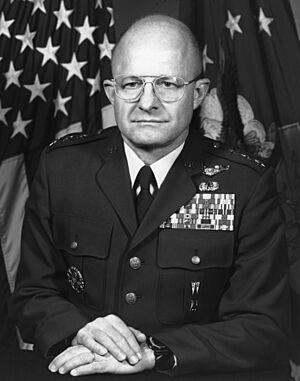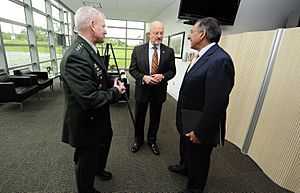James Clapper facts for kids
Quick facts for kids
James Clapper
|
|
|---|---|
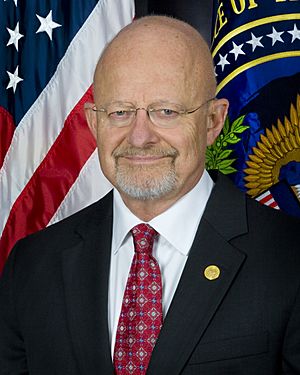 |
|
| 4th Director of National Intelligence | |
| In office August 9, 2010 – January 20, 2017 |
|
| President | Barack Obama |
| Deputy | Stephanie O'Sullivan |
| Preceded by | Dennis C. Blair |
| Succeeded by | Dan Coats |
| Under Secretary of Defense for Intelligence | |
| In office April 15, 2007 – June 5, 2010 |
|
| President |
|
| Preceded by | Stephen Cambone |
| Succeeded by | Michael Vickers |
| Director of the National Geospatial-Intelligence Agency | |
| In office September 2001 – June 2006 |
|
| President | George W. Bush |
| Preceded by | James C. King |
| Succeeded by | Robert B. Murrett |
| Director of the Defense Intelligence Agency | |
| In office November 1991 – August 1995 |
|
| President | |
| Preceded by | Dennis M. Nagy |
| Succeeded by | Kenneth Minihan |
| Personal details | |
| Born |
James Robert Clapper Jr.
March 14, 1941 Fort Wayne, Indiana, U.S. |
| Spouse | Susan Terry |
| Children | 2 |
| Education |
|
| Military service | |
| Allegiance | |
| Branch/service | |
| Years of service | 1963–1995 |
| Rank | Lieutenant General |
| Battles/wars | Vietnam War |
| Awards |
|
James Robert Clapper Jr. (born March 14, 1941) is a retired lieutenant general from the United States Air Force. He also served as the Director of National Intelligence, which is a very important job in the U.S. government.
Clapper held many key roles in the United States Intelligence Community. This community is a group of government agencies that collect and analyze information to protect the country. He was the director of the Defense Intelligence Agency (DIA) from 1992 to 1995. He also led the National Geospatial-Intelligence Agency (NGA) from 2001 to 2006.
In 2010, President Barack Obama chose Clapper to be the United States Director of National Intelligence. The Senate, which is part of the U.S. Congress, approved him for this role. He served in this position until January 2017.
In 2013, there was a public discussion about the NSA collecting phone records from millions of Americans. Clapper had previously told a committee that the NSA did not collect data on millions of Americans. He later explained his answer. After leaving government, Clapper joined a research group and became a national security expert for CNN.
Contents
Early Life and Education
James Robert Clapper Jr. was born on March 14, 1941, in Fort Wayne, Indiana. His father worked in US Army signals intelligence during World War II. His father later retired as a colonel.
Clapper finished high school in West Germany in 1959. His father was stationed there at the time.
He earned a Bachelor of Science degree in political science from the University of Maryland in 1963. He later received a Master of Science degree in political science from St. Mary's University, Texas, in 1970.
Military Career and Service
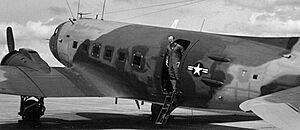
Clapper first joined the United States Marine Corps Reserve. He then transferred to the Air Force Reserve Officer Training Corps program. In 1963, he became an Air Force second lieutenant.
He served two times in Southeast Asia, including during the Vietnam War. He commanded a group that collected signals intelligence in Thailand. He also flew 73 missions in EC-47s. Later, he led a signals intelligence wing in Maryland. During the Persian Gulf War, Clapper was the Chief of Air Force Intelligence.
In November 1991, Clapper became the Director of the Defense Intelligence Agency. He helped change how intelligence was analyzed. He retired from active duty in September 1995 after 32 years of service.
After his military career, he worked in private companies for six years. In 2001, he became the director of the National Imagery and Mapping Agency. This agency was later renamed the National Geospatial-Intelligence Agency.
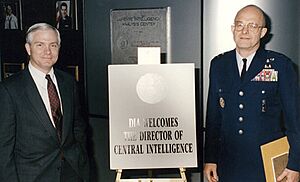
Working in the Private Sector
From 2006 to 2007, Clapper worked for a satellite company called GeoEye. He also served on the boards of three companies that worked with the government. Two of these companies did business with the NGA while he was its director.
He also worked for other companies like Detica, SRA International, and Booz Allen Hamilton. Clapper believed that private companies played an important role in gathering intelligence.
Leading Defense Intelligence
In 2007, President George W. Bush nominated Clapper to be the Under Secretary of Defense for Intelligence. The United States Senate approved him for this role. He was the second person to hold this position.
In this job, he oversaw important intelligence agencies. These included the Defense Intelligence Agency, the National Geospatial-Intelligence Agency, the National Security Agency (NSA), and the National Reconnaissance Office.
Director of National Intelligence (2010–2017)
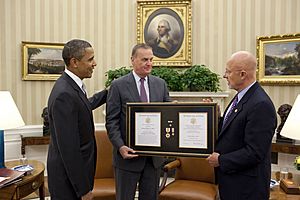
Becoming the Director
Defense Secretary Robert Gates suggested to President Obama that Clapper should become the Director of National Intelligence. Obama announced his choice on June 5, 2010. He said Clapper was willing to "tell leaders what we need to know even if it's not what we want to hear."
Lawmakers approved his nomination on August 5, 2010. Clapper promised to improve how the intelligence community worked together.
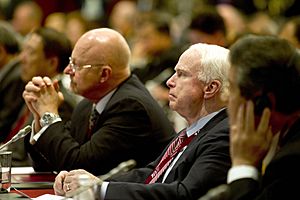
Improving Intelligence Sharing
Clapper made it a main goal to improve how different intelligence agencies shared information. In 2012, his office started a plan to create a common computer system for the entire Intelligence Community. This would help agencies work together more easily.
NSA Surveillance Discussion
In March 2013, during a hearing, Senator Ron Wyden asked Clapper if the NSA collected data on millions of Americans. Clapper replied, "No, sir." He added, "Not wittingly."
Later, documents leaked by Edward Snowden showed that the NSA had collected phone records from many Americans. Clapper then explained that the NSA collected "metadata" (like phone numbers and call times) but not the content of calls. He said this was allowed under a law called the Patriot Act.
Clapper later apologized for his earlier answer. He told the Senate Intelligence Committee that his response was "clearly erroneous." He explained that he had forgotten about a specific part of the Patriot Act when he answered the question. Some lawmakers criticized his answer, but the White House supported him.
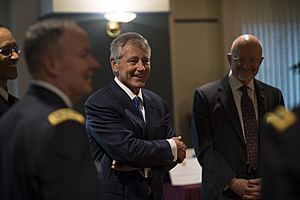
Rules for Media Contact
In March 2014, Clapper signed a rule that stopped intelligence employees from sharing information with reporters without permission. This rule was meant to stop leaks of secret information.
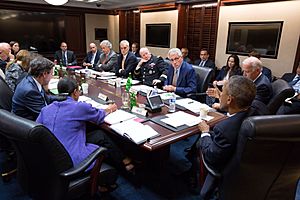
ACLU v. Clapper Lawsuit
In June 2013, the American Civil Liberties Union (ACLU) sued Clapper and others. They argued that the government's collection of phone data was against the Fourth Amendment. A court first said the collection was allowed. However, in 2015, a higher court ruled that the Patriot Act did not allow the large-scale collection of phone data.
Resignation
In November 2016, Clapper announced he would resign. His resignation became effective at the end of President Obama's term in January 2017.
Life After Government Service
Joining Australian National University
In June 2017, Clapper began a four-week visit at the Australian National University (ANU). He gave public talks about important global and national security issues.
CNN National Security Analyst
In August 2017, CNN hired Clapper as a national security analyst. He shares his knowledge and opinions on national security topics.
Views on Russia
In 2017, Clapper stated that Russia is the main opponent of the United States. He explained that he believes Russians are "almost genetically driven" to act against the U.S. and Western democracies.
In the Media
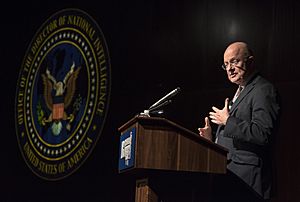
In 2010, Clapper was interviewed by Diane Sawyer and admitted he was unaware of some arrests of alleged terrorists in Great Britain that day.
In 2011, during protests in Egypt, Clapper described the Muslim Brotherhood as a "largely secular" group that avoided violence. The Obama administration later clarified his statement.
In 2016, Clapper listed Russia, China, Iran, North Korea, Islamic State, and "homegrown extremists" as major threats to the United States.
In March 2017, Clapper stated that the Office of the Director of National Intelligence had not obtained a court order to tap Trump Tower. He also said he saw no evidence of secret cooperation between the Trump campaign and Russia.
Personal Life
In 1965, Clapper married Susan Ellen Terry. She used to work for the National Security Agency. They have two children, a daughter named Jennifer and a son named Andrew.
Clapper also has a brother, Mike, and a sister, Chris.
Education and Training
- 1963: Bachelor of Science degree in political science, University of Maryland
- 1970: Master of Arts degree in political science, St. Mary's University, Texas
- 1973: Air Command and Staff College, Maxwell Air Force Base, Montgomery, Alabama
- 1975: Distinguished graduate, Armed Forces Staff College, Norfolk, Virginia
- 1976: Air War College, Maxwell Air Force Base, Montgomery, Alabama
- 1979: National War College, Fort Lesley J. McNair, Washington, D.C.
- 1990: Program for Senior Executives in National and International Security, Harvard University, Cambridge, Massachusetts
- 1990: Harvard Defense Policy Seminar, Harvard University, Cambridge, Massachusetts
Clapper also has an honorary doctorate in strategic intelligence. He taught as a professor at the Joint Military Intelligence College.
Awards and Honors
Military Awards
| Air Force Basic Officer Aircrew Badge | |
| Basic Space and Missile Badge | |
| Basic Missile Maintenance Badge | |
 |
Office of the Joint Chiefs of Staff Identification Badge |
| Defense Distinguished Service Medal | |
| Air Force Distinguished Service Medal | |
| Defense Superior Service Medal | |
| Legion of Merit with two bronze oak leaf clusters | |
| Bronze Star with oak leaf cluster | |
| Defense Meritorious Service Medal | |
| Meritorious Service Medal with oak leaf cluster | |
| Air Medal with oak leaf cluster | |
| Joint Service Commendation Medal | |
| Air Force Commendation Medal | |
| Air Force Outstanding Unit Award with Valor device and two oak leaf clusters | |
| Air Force Organizational Excellence Award | |
| National Intelligence Distinguished Service Medal | |
| Department of Defense Distinguished Civilian Service Award | |
| National Defense Service Medal with one bronze service star | |
| Vietnam Service Medal with three service stars | |
| Air Force Overseas Short Tour Service Ribbon with two oak leaf clusters | |
| Air Force Overseas Long Tour Service Ribbon with two oak leaf clusters | |
| Air Force Longevity Service Award with one silver and two bronze oak leaf clusters | |
| Small Arms Expert Marksmanship Ribbon | |
| Air Force Training Ribbon | |
| Republic of Korea Order of National Security Merit, Cheon-su Medal | |
| French National Order of Merit (Commander) | |
| Officer of the Order of Australia (Honorary – Military Division) – October 5, 2012 | |
| Royal Norwegian Order of Merit (Commander with Star) | |
| Grand Cordon of the Order of the Rising Sun | |
| Vietnam Gallantry Cross Unit Citation | |
| Vietnam Campaign Medal |
Other Awards
- William Oliver Baker Award (2006)
- Rosemary Award from the National Security Archive (2013)
Images for kids
See also
 In Spanish: James Clapper para niños
In Spanish: James Clapper para niños
 | Jewel Prestage |
 | Ella Baker |
 | Fannie Lou Hamer |


